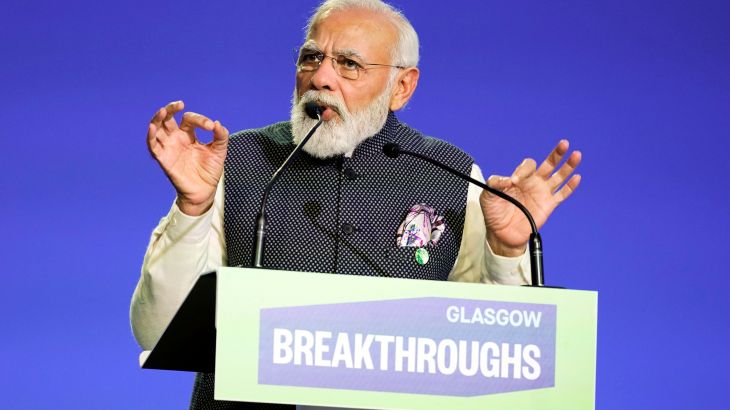
Can India actually deliver on its bold climate promises?
On Thursday, November 11, 2021 at 19:30 GMT:
India’s Prime Minister Narendra Modi surprised the world this month by pledging to make a substantial shift to green energy by 2030 and achieve net-zero carbon emissions by 2070.
Advocates say the new goals are ambitious but necessary. India is ranked among the world’s most vulnerable countries when it comes to climate change. In recent years, it has been hit with myriad climate-related disasters, including incessant rainfall, deadly flooding and intense heat waves.
Currently, even though it is home to one-fifth of the world’s population, India is only responsible for 6 percent of global emissions. But the country is also the world’s third-largest carbon emitter, and has been ramping up coal consumption to fuel its booming economy.
Experts say reconciling the need to reduce emissions while meeting the energy demands of nearly 1.4 billion people will require detailed plans and a huge financial commitment in renewables. But India’s survival depends on it, says Sumaira Abdulali, environmentalist and founder of the NGO Awaaz Foundation.
Speaking to DW this month, Abdulali said: “In theory, the problems of climate change are unmistakable and well acknowledged, but in practice, in the face of development imperatives, we have not learned any lessons at all despite all types of climate-related catastrophic events. We seem clearly headed towards further climate disaster.”
In this episode of The Stream we ask, can India actually deliver on its bold climate promises? Join the conversation.
On this episode of The Stream, we speak with:
Kabir Agarwal, @kabira_tweeting
Journalist, The Wire
Ritu Bharadwaj, @RituBharadwaj16
Senior Researcher, International Institute for Environment and Development (IIED)
Vaibhav Chaturvedi
Economist, Council on Energy Environment and Water (CEEW)